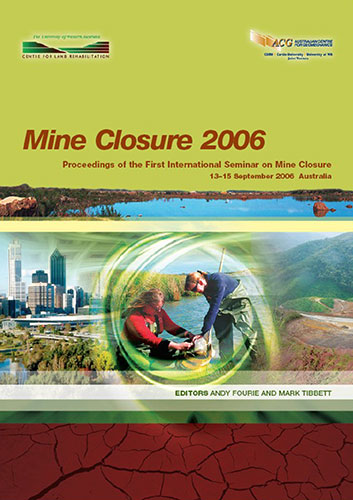Challenges Faced by Large Mines in Botswana in the Development and Execution of Mine Closure Plans

|
Authors: Abi, K |
DOI https://doi.org/10.36487/ACG_repo/605_8
Cite As:
Abi, K 2006, 'Challenges Faced by Large Mines in Botswana in the Development and Execution of Mine Closure Plans', in AB Fourie & M Tibbett (eds), Mine Closure 2006: Proceedings of the First International Seminar on Mine Closure, Australian Centre for Geomechanics, Perth, pp. 161-168, https://doi.org/10.36487/ACG_repo/605_8
Abstract:
This paper is intended to explore challenges faced by large mines in Botswana in planning and execution of mine closure plans. It identifies key issues and makes some suggestions as to how they may be addressed. Large scale mining in Botswana has a positive legacy. The large mines have provided the much needed jobs, government revenues, business for linking industries and social investment in skills development, housing, health facilities and infrastructural development such as roads. The fact remains however that mining entails exploitation of finite resources and mine closures are inevitable. Large mining companies in Botswana face challenges in the preparation and execution of mine closure plans which include: • Inadequacy of environmental legislation to guide the companies. • Inadequacy of environmental expertise to guide the mine closure process from planning to final closure. • Meeting approval requirements of the authorities for the mine closure plans. • Gaining acceptance of communities for the mine closure plans. • Sustainability of Social investment programs by mining companies. • Preservation of a positive legacy. The suggested way forward in dealing with these challenges is for mining companies to: • Establish environmental management systems and adopt sustainable development frameworks that meet international standards and norms. • Take it upon themselves to develop environmental expertise including offering training opportunities for third parties. • Involve communities intimately in the mine closure process so as to gain informed acceptance for mine closure plans. • Develop integrated mine closure plans such that both the environmental and social issues are adequately addressed. This will minimise the adverse socio-economic impacts upon mine closure and in turn preserve a positive legacy for the mining company. • Make their Social investment programs autonomous such that they can be sustained beyond mine life. The authorities also have a challenge to expeditiously develop and consolidate the relevant legislation, develop capacity to effectively deal with mine closure issues and develop a reasonable financial assurance framework for mine closure. Some initiatives are already underway to address these challenges such as the formulation of regulations and sector guidelines under the Environmental Impact Assessment Act, Promulgation of the Environmental Management Act and capacity building under the Environment Support Programme. Mine Closure 2006 ― Andy Fourie and Mark Tibbett (eds) © 2006 Australian Centre for Geomechanics, Perth, ISBN 0-9756756-6-4 Mine Closure 2006, Perth, Australia 161
References:
Berlin II Guidelines for Mining and Sustainable Development, United Nations (2002).
Environmental Impact Assessment Act, Act No. 6 of 2005, Botswana Government Printer.
Employment Act (Cap 47:01 of the Laws of Botswana), Act No. 14 of 2003, Botswana Government Printer.
Good Practice Guidance for Mining and Biodiversity, ICMM (2006).
ICMM Sustainability Development Framework, ICMM (2003).
Mine Closure Guidelines for Minerals Operations in Western Australia, Chamber of Minerals and Energy of Western
Australia Inc (2000).
Mines and Minerals Act (Cap 66:01 of the Laws of Botswana), Act No. 17 of 1999, Botswana Government Printer.
Mines, Quarries, Works and Machinery Act (Cap 44:02 of the Laws of Botswana), Act No. 15 of 1995, Botswana
Government Printer.
Monuments and Relics Act (Cap 59:03 of the Laws of Botswana), Act No. 12 of 2001, Botswana Government Printer.
Principles for the Conduct of Company Operations within the Minerals Industry, Australian Non-Government
Organisations (1998).
Waste Management Act (Cap 65:06 of the Laws of Botswana), Act No. 15 of 1998, Botswana Government Printer.
Reporting against the ICMM Sustainable Development Principles, ICMM (2005).
Tribal Land Act (Cap 32:02 of the Laws of Botswana), Act No. 1 of 2003, Botswana Government Printer.
Challenges Faced by Large Mines in Botswana in the Development
and Execution of Mine Closure Plans
K. Abi
168 Mine Closure 2006, Perth, Australia
© Copyright 2026, Australian Centre for Geomechanics (ACG), The University of Western Australia. All rights reserved.
View copyright/legal information
Please direct any queries or error reports to repository-acg@uwa.edu.au
View copyright/legal information
Please direct any queries or error reports to repository-acg@uwa.edu.au